
You walk into Arlington, Virginia. As the Pentagon comes into view, you’ll be able to see either two or three sides of the building. Which is more likely?

You walk into Arlington, Virginia. As the Pentagon comes into view, you’ll be able to see either two or three sides of the building. Which is more likely?

Stage instruction from La Tragedia de Baskerville, a five-act drama mounted in Bilbao in 1915 by Gonzalo Jóver and Enrique Arroyo:
El perro ha de ser de atrezzo, grande, negro, de cabeza achatada, en los ojos dos lámparas eléctricas rojas y otra en la boca, simulando la parte de la lengua. El perro irá montado sobre ballestas arquedas, con las patas extendidas en actitud de galopar. Las dos ballestas se unen por dos travesaños que irán debajo de las patas. Del travesaño delantero se engancha un alambre, del cual se tirará fuertemente, para que el perro corra con el movimiento propio del galope. Para que no se vea el montaje es necesario que los apliques sean más altos que el practicable del camino.
The dog, large and black, with red electric lights for eyes and another to indicate the tongue, is to be mounted on arched crossbows, with paws extended as though running. The crossbows are to be joined by two cross timbers, placed under the feet, and to the foremost cross piece a copper wire is to be attached in such fashion that it may be vigorously pulled, to give the animal a galloping movement. Arrangement of the mechanical mounting is to be such that the appliances are not visible from the audience.
Historian Paul Patrick Rogers notes that the play “seems never to have reached Madrid.”
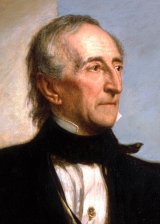
John Tyler, the 10th president of the United States, has two living grandchildren.
Tyler (1790-1862) was 63 when he fathered his seventh son, Lyon Gardiner Tyler, in 1853. And Lyon was in his 70s when he fathered two boys, Lyon Gardiner Tyler Jr. in 1924 and Harrison Ruffin Tyler in 1928. (Harrison, now 84, owns Sherwood Forest, the Virginia plantation that his grandfather purchased in 1842.)
This makes Tyler the oldest U.S. president with living grandchildren. Second place belongs to James Garfield, who was 41 years younger than Tyler.
(Thanks, Arnold.)
cunctator
n. a procrastinator
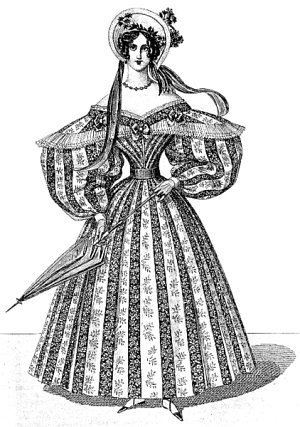
Effects of lightning on Mrs. T.T. Boddington, struck as her post-chariot departed Tenbury on April 13, 1832, as reported in the Lancet:
The … electric fluid … struck the umbrella she had in her hand; it was an old one made of cotton, and had lost the ferule that is usually placed at the end of the stick, so that there was no point to attract the spark. It was literally shivered to pieces, both the springs in the handle forced out, the wires that extended the whalebones broken, and the cotton covering rent into a thousand shreds. From the wires of the umbrella the fluid passed to the wire that was attached to the edge of her bonnet, the cotton thread that was twisted round that wire marking the place of entrance, over the left eye, by its being burnt off from that spot all round the right side, crossing the back of the head and down into the neck above the left shoulder. The hair that came in contact with it was also singed; it here made a hole through the handkerchief that was round the throat, and zigzagged along the skin of the neck to the steel busk of her stays, leaving a painful but not deep wound, and also affecting the hearing of the left ear. … There were marks of burning on the gown and petticoat above the steel; and the inside of the stays, and all the garments under the stays, were pierced by the passage of the fluid to her thighs, where it made wounds on both; but that on the left so deep, and so near the femoral artery, that the astonishment is, that she escaped with life;–even as it was, the hemorrhage was very great.
It also magnetized her corset:
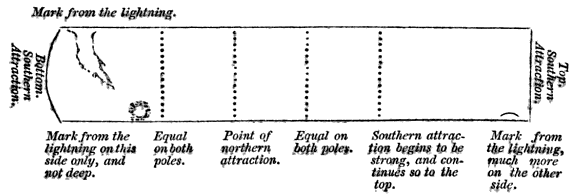
“Both ends attract strongly the south pole of the needle, the upper part for some considerable way down; it then begins to lose power over the south pole, and the point of northern attraction is at about one third of the length of the busk from the bottom; so that by far the greatest portion of the whole has acquired southern attraction.”
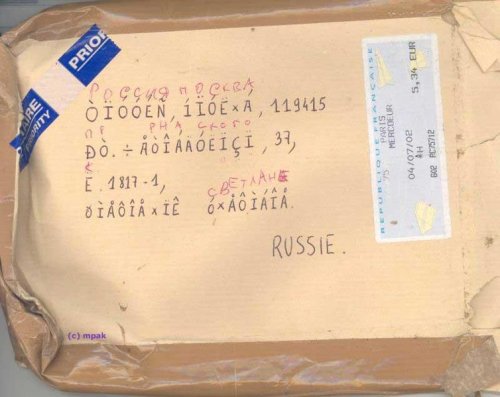
In 2002 a Russian student emailed her postal address to a friend in France so that she could send her a Harry Potter book. Unfortunately the French friend’s email program was not set up to display Cyrillic characters; instead, it produced diacritics from the Western character set. Apparently not realizing the error, the French girl copied them down and mailed the package. Postal employees realized what had happened, deciphered the address, and delivered the book successfully. (Thanks, Nicholas.)
Readers of the Strand seemed to delight in torturing the post office. In 1908 one mailed this card, which was delivered successfully, though postal officials said it took them 20 minutes to decipher it:
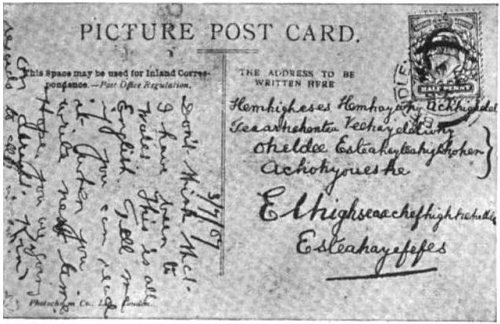
The address reads “Hemhigheses Hemhayary Achhighelel, Teaarhehentea Veehayelelwhy, Oheldee Esteahayteahighhohen Achohyoueshe, Elhighseaachefhighhehelldee, Esteahayefefes.” “The puzzle … is quite an easy matter once the clue is obtained.”
This American letter was mailed late one Sunday night in 1902:
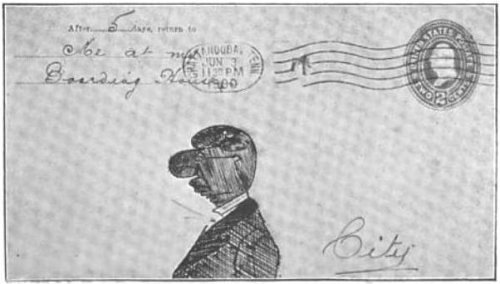
It was delivered correctly the next morning to Alfred Craven of Chattanooga, Tenn., who remarked, “I think it shows the efficiency of our postal service.” The profile is made up of the letters A. CRAVEN.
An innocent maiden of Gloucester
Fell in love with a coucester named Foucester;
She met him in Leicester,
Where he merely careicester,
Then the hard-headed coucester just loucester.
There was a young lady of Worcester
Who urcest to crow like a rorcester;
She urcest to climb
Two trees at a time,
But her sircester urcest to borcester.
“There’s a train at 4.04,” said Miss Jenny.
“Four tickets I’ll take. Have you any?”
Said the man at the door,
“Not four for 4.04,
For four for 4.04 are too many.”
A certain young fellow named Beebee
Wished to wed with a lady named Phoebe.
But said he, “I must see
What the clerical fee
Be before Phoebe be Phoebe Beebee.”
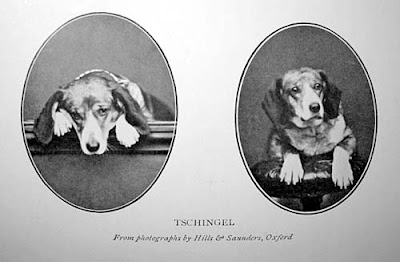
In 1868, American alpinist W.A.B. Coolidge received a unique gift — Tschingel, a 3-year-old dog with a preternatural passion for mountaineering. Though he was “not at all a dog fancier,” Coolidge began to take her on expeditions, and he watched as she climbed the Torrenthorn (2,998 meters), crossed the Gemmi pass (2,316 meters), and reached the summit of the Blümlisalphorn (3,664 meters) — where she slipped on the final slope and was caught by her collar as she slid toward the Oeschinensee. “She seemed to like it very much,” he wrote, “and, so we thought, the panoramas from tops, running on ahead of us to the summit of a peak, and then running back to encourage us by showing how near we were to the wished-for goal.”
So she joined the team. Over the next 11 years Tschingel and Coolidge climbed 30 peaks and crossed 36 passes. While climbing, she was roped to her companions by a cord passed through her collar; they made leather boots to preserve her feet, but she always kicked them off. As they climbed the Aletschhorn (4,195 meters), Coolidge wrote, “my aunt went up the Sparrhorn to look at us, and we waved Tschingel in the air as a sort of red flag.”
Her greatest conquest was the Breithorn, at 4,171 meters; when she descended from Monte Rosa, some English climbers elected her an “honorary lady member” of the Alpine Club. She died in her sleep in Surrey in 1879.
Forty years later Alpine historian Monroe Thorington visited Coolidge at his home in Grindelwald. “Just when I was leaving, he pointed to the door,” he recalled later. “There on a hook was Tschingel’s collar with the little bangles shining in the sun. Not a word was said, but Coolidge managed something resembling a smile.”
See The Dog of Helvellyn and Nine Lives Left.
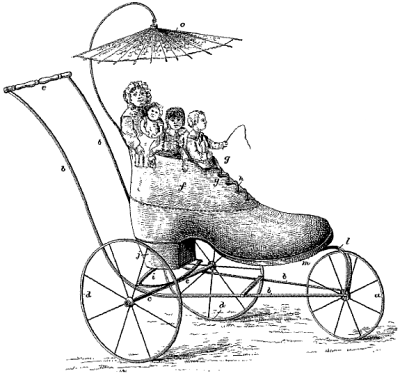
There was an old woman who lived in a shoe … and presumably she needed to take her kids for a stroll occasionally. Iowa inventory George Clark patented this “child’s carriage” in 1884. The shoe is fitted with a lace cord, h, so that “the child or doll may be placed in the carriage and then held securely in place without danger of falling out.”
“If desired, the carriage may be provided with an umbrella, o.”